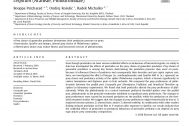Year
2018Authors
Ing. Ondřej Košulič, Ph.D.Mgr. Radek Michalko, Ph.D.
Species
Philodromus cespitum (Walckenaer, 1802) ESContent
Even though pesticides can have various sublethal effects on behaviour of biocontrol agents, no study to date has investigated the effects of pesticides on the prey choice of generalist predators. Prey choice of generalist predators is among key factors determining the predation pressure they exert on pests, because it influences fitness of predators and consequently their densities and per capita capture rate. Here, we investigated the effect of Integro (a.i. methoxyfenozide) and SpinTor 480 Sc (a.i. spinosad) on prey choice and predatory activity of the spider Philodromus cespitum, which is known significantly to reduce hemipteran and dipteran pests in fruit orchards. We compared the prey preferences of philodromids between the psyllid pest Cacopsylla pyri (Hemiptera, Psyllidae) and beneficial Theridion sp. spiders in laboratory experiments. We found that both pesticides altered the prey preferences of philodromids. While the philodromids in a control treatment preferred theridiid spiders over the psyllid pest, philodromids in the pesticide treatments exhibited no significant prey preferences. The changes in prey preferences were caused by increased predation on the psyllids, while the predation on the theridiid remained similar. We suggest that the changes in prey preferences might theoretically be due to 1) impaired sensory systems, 2) altered taste, and/or 3) altered mobility. In combination with other studies finding reduced predation on fruit flies in Philodromus cespitum after exposure to SpinTor, our results indicate that the sublethal effects of pesticides on predatory behaviour of generalist predators can depend on prey type and/or prey community composition.



